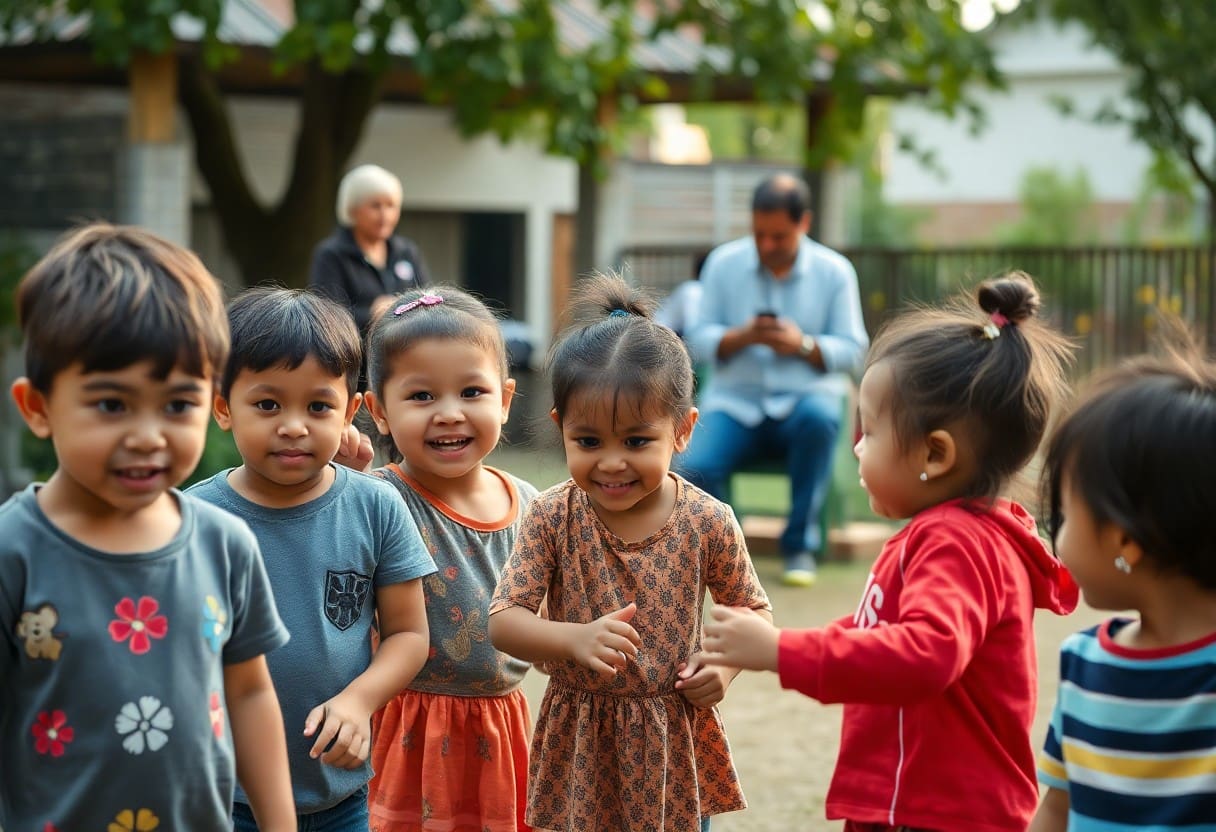Most families face challenges during relationship investigations, and your priority should always be the well-being of your children. Understanding how to navigate these sensitive situations with compassion is important to ensure their emotional and psychological safety. In this post, we will explore effective strategies for protecting your children during such investigations, offering you insights into maintaining a nurturing environment while addressing the complexities of your relationship dynamics. By diligently applying these approaches, you can create a supportive atmosphere that prioritizes your children’s needs during difficult times. Ouur spcialists at will offer step by step assistance on protecting children during divorce investigations.
Key Takeaways:
- Active collaboration between legal professionals, social services, and mental health experts is imperative to ensure the well-being of children during relationship investigations.
- Utilizing a compassionate approach promotes open communication, helps to reduce trauma for the children, and encourages a supportive environment for their emotional needs.
- Implementing trauma-informed practices is vital in addressing the unique experiences of children, ensuring their safety and stability throughout the investigative process.
Understanding the Impact of Relationship Investigations
The emotional consequences of relationship investigations can be profound. These situations often create uncertainty and anxiety for children, making it important for you to recognize the signs of distress. As the investigation unfolds, children may feel insecure or confused, affecting their behavior and overall emotional well-being. Being aware of these impacts allows you to provide the support and guidance they need during challenging times.
Emotional Effects on Children
Around the tumult of a relationship investigation, children may experience a turbulent mix of emotions, including fear, sadness, and confusion. They may struggle to process the changes in their environment and relationships, which makes your role as a supportive figure even more important. Providing a safe space for them to express their feelings can significantly alleviate their anxiety and foster resilience.
Legal Ramifications and Child Welfare
At times, relationship investigations can escalate into legal battles that directly affect child welfare. The legal system often focuses on the best interests of the child, which can lead to court mandates regarding custody and visitation. For you, understanding these legal ramifications is vital, as they can have lasting impacts on your child’s upbringing and emotional state.
Relationship investigations can involve various legal considerations, impacting custody arrangements and parental rights. When courts assess the case, they typically prioritize the child’s welfare, which necessitates a clear understanding of your rights and responsibilities. It’s important to obtain legal advice and actively participate in any hearings or assessments to advocate for the best possible outcome for your child. The process may also include home evaluations, psychological assessments, and involvement from social services, all aimed at ensuring a safe environment for the child amidst the complexities of relationship disputes.

Best Practices for Engaging with Children
While engaging with children during relationship investigations, it’s vital to prioritize their emotional well-being. Building a connection through genuine empathy allows you to establish trust, making it easier for them to share their feelings. Being patient and understanding ensures they feel heard and valued, which facilitates a more open dialogue. You should focus on their perspective, creating an atmosphere where they feel comfortable expressing themselves without fear of judgment.
Creating a Safe Environment
Safe spaces foster trust and open communication. To create this environment, ensure that the setting is comfortable, quiet, and free from distractions. Engage with the child at their eye level, using a friendly demeanor to put them at ease. This way, they will feel secure enough to share their feelings and experiences without anxiety or fear.
Using Age-Appropriate Language
After creating a safe environment, it’s important to communicate using age-appropriate language. Tailoring your words to fit the child’s developmental stage helps them understand what you’re discussing and allows for clearer communication. This approach not only encourages engagement but also enhances their confidence in speaking freely.
In fact, using age-appropriate language is about more than just vocabulary—it’s also about context and tone. You should simplify complex ideas, avoiding jargon that might confuse them. Consider their interests, using relatable examples that resonate with their experiences. This method fosters a connection and ensures they grasp the conversation’s essence, allowing for a more effective dialogue.
Strategies for Supporting Children During Investigations
Keep in mind that supporting children during relationship investigations involves a thoughtful and compassionate approach. By focusing on their emotional needs and fostering open communication, you can create a safe space for them to express themselves. This not only helps them cope with the situation but also strengthens their resilience during challenging times.
Providing Emotional Support
Support your child by being present and attentive to their feelings. Offer a listening ear and validate their emotions, ensuring they know it’s okay to feel confused or scared during these times. Create a nurturing environment where they feel safe to share their thoughts and experiences without judgment.
Encouraging Open Communication
Below are key strategies to help your child feel comfortable discussing their feelings and concerns throughout the investigation. Encourage your child to express their thoughts and emotions openly by actively listening and engaging in age-appropriate conversations. Assure them that their feelings are valid, allowing them to articulate what they are experiencing.
At the heart of effective communication is the ability to create a trusting relationship with your child. Approach discussions with empathy and patience, allowing them to guide the conversation based on their comfort level. Use open-ended questions to promote dialogue, and reassure them that they can talk about anything they may be feeling. Providing consistent opportunities for conversation will empower your child to share their thoughts and feelings as they navigate this challenging situation.

The Role of Professionals in Protecting Children
Despite the challenges that arise during relationship investigations, professionals play a vital role in safeguarding children. Their expertise ensures that children’s needs are prioritized, providing them with a supportive environment amid potential parental conflict. By working collaboratively, these professionals aim to minimize emotional distress and promote the best outcomes for children, allowing you to focus on maintaining stability and security in their lives.
Involvement of Social Workers
Involvement of social workers can significantly enhance the support system available for your children during relationship investigations. They assess situations, engage with families, and provide valuable resources to ensure the emotional and physical well-being of children. Social workers act as advocates, ensuring children’s voices are heard and their best interests are considered, allowing you to navigate the complexities of the investigation process with confidence.
Collaboration with Legal Experts
Along with social workers, legal experts play a pivotal role in the protection of children during relationship investigations. Their understanding of the law ensures that children’s rights are upheld, guiding you through complex legal proceedings and helping you make informed decisions.
Plus, legal experts can help you access vital resources and advocate for your children during court proceedings. By collaborating with family law attorneys, you ensure that your children’s interests are prioritized, and any legal agreements reflect their best interests. This partnership can lead to a more favorable outcome and the establishment of protective measures, ensuring a safe environment for your children as you work through the investigation process.
Training for Investigators
To ensure a thorough and sensitive approach to investigations involving children, you should seek training that emphasizes best practices. Resources like provide crucial insights into effective techniques for engaging with young witnesses while minimizing trauma.
Understanding Child Development
Any investigator must have a solid grasp of child development stages to communicate appropriately with children. Each child’s emotional and cognitive maturity varies, which impacts how they process and articulate their experiences. Understanding these differences aids in creating a supportive environment that encourages open communication.
Compassionate Approaches in Practice
By employing compassionate strategies during investigations, you create a supportive atmosphere that prioritizes the child’s emotional well-being. Your approach should integrate patience, active listening, and age-appropriate communication to help the child feel safe and understood.
Investigators must focus on building rapport with the child, which can significantly affect the quality of the information shared. This involves being attentive to non-verbal cues, reassuring the child, and using simple language that they can easily comprehend. Approaching the situation with empathy ensures that the child feels heard and respected, fostering an environment conducive to honest and open dialogue.
Case Studies and Real-Life Applications
After exploring the impact of conflict and the emotional toll on children, you can gain insights from various case studies highlighting different approaches in relationship investigations:
- Case Study 1: A family in Oregon saw a 40% increase in child emotional well-being after utilizing a mediation approach.
- Case Study 2: In New York, parents who engaged in co-parenting workshops reported a 30% reduction in disputes within one year.
- Case Study 3: A Minnesota pilot program showed that children exposed to supportive communication channels saw a 50% improvement in behavioral issues.
- Case Study 4: Community-based initiatives in California achieved a 25% increase in joint custody arrangements that benefited children’s stability.
Successful Outcomes
At the heart of these case studies lies the potential for positive resolutions. By implementing compassionate strategies, families can create environments where children thrive, significantly reducing trauma associated with relationship investigations. These successful outcomes underscore the value of proactive engagement in fostering healthier relationships among all parties involved.
Lessons Learned
Among the most valuable insights from these cases is the significance of open communication and collaboration between parents. Prioritizing the child’s needs during investigations can lead to more constructive outcomes for everyone involved, demonstrating that empathetic approaches can enhance conflict resolution.
In addition to open communication, understanding each parent’s perspective strengthens the potential for amicable solutions. Case studies reveal that when parents commit to a shared focus on their children’s well-being, they are more likely to resolve key issues effectively, allowing children to adapt better to changes within their family dynamics. These learned lessons can guide future investigations towards more compassionate and effective methods.
Summing up
Now that you understand the importance of protecting children during relationship investigations, you are better equipped to approach these sensitive situations with compassion and care. By prioritizing the well-being of children and taking the necessary steps to create a safe environment, you can facilitate constructive discussions and foster healthier outcomes. Always keep in mind that your approach can significantly influence the emotional and psychological health of the children involved, ensuring their voices are heard and respected throughout the process.
FAQ
Q: What approaches can be taken to ensure the emotional well-being of children during relationship investigations?
A: It is crucial to employ a compassionate approach that prioritizes the emotional and psychological needs of the children involved. This can include providing age-appropriate explanations about the investigation, creating a safe and supportive environment for them to express their feelings, and ensuring they have access to mental health professionals if needed. Additionally, maintaining open communication with children helps them feel more secure and understood throughout the process.
Q: What role do parents or guardians play in protecting children during these investigations?
A: Parents and guardians play a vital role in safeguarding their children’s well-being during relationship investigations. They should remain present and engaged, offering emotional support and reassurance. It is important for them to communicate openly with their children about the situation in an age-appropriate manner and to advocate for their child’s comfort during the process. Involving a trusted family member or counselor can also provide additional support for the child, helping them feel secure and understood.
Resources

